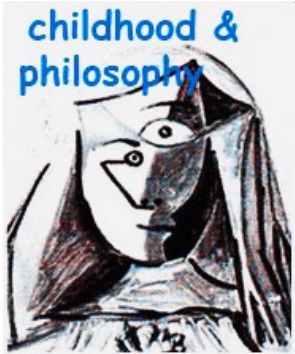urgência existencial: uma provocação para pensar "diferente"
DOI:
https://doi.org/10.12957/childphilo.2023.71997Palavras-chave:
Heidegger, Merleau-Ponty, encarnação, pensamento, sensibilidade.Resumo
Neste ensaio, expandimos a noção de pensamento enfatizando a provocação e a urgência de pensar e também reconceptualizando o pensamento como uma prática corporizada. O objetivo é expandir a abordagem de Lipman e Sharp à investigação filosófica com crianças e mostrar como outras formas de pensar podem ser incluídas. Esforçamo-nos para desdobrar uma forma de "pensar" que é tanto diferente da racionalidade (pensamento crítico), quanto do pensamento criativo e cuidadoso. Na primeira parte do artigo, discutimos os méritos do pensamento crítico, criativo e carinhoso de Lipman e Sharp, dentro da Comunidade de Investigação Filosófica (CIF). Em seguida, expandimos o método filosófico de Lipman/Sharp através do Modelo de Cinco Dedos de Ekkehart Marten, que permite diferentes abordagens filosóficas. Na segunda metade do trabalho, baseamo-nos no texto O que significa pensar?, de Martin Heidegger, para desenvolver seu conceito de "chamada" para pensar, juntamente com as noções de provocação e urgência. Com base nisso, recorremos a Maurice Merleau-Ponty para mostrar como este chamado não é uma atividade intelectual ou um mero exercício da "mente", mas afeta toda a nossa existência. Assim, o pensamento torna-se uma resposta a uma urgência existencial que é uma prática corporizada. Usando conceitos como encarnação, afeto e sensibilidade, tentamos ampliar nossa concepção de pensamento em uma CIF. Por fim, esperamos que isto permita aos facilitadores ouvir a voz única de cada criança para que ninguém fique sem ser ouvido.Downloads
Referências
Aslanimehr, P. (unpublished manuscript). Exilic Subjectivity.
Carvalho, M. C., & Mendonça, D. (2017). Thinking as a community: reasonableness and emotion. In M. R. Gregory, J. Haynes & K. Murris (Eds.),The Routledge International Handbook of Philosophy of Children (pp. 127-134). Routledge.
Gregory, M., Haynes, J., & Murris, K. (2017). The Routledge International Handbook of Philosophy for Children. Routledge.
Gregory, M. R., & Laverty, M. (2018). In Community of Inquiry with Ann Margaret Sharp: Childhood, Philosophy and Education. Routledge.
Hadot, P. (1999). Wege zur Weisheit. Eichborn.
Haynes, J., & Murris, K. (2021). right under our noses: the postponement of children’s political equality and the now. childhood & philosophy, 17(fev), 1- 21.
Heidegger, M. (1954). Was Heisst Denken? Max Niemeyer Verlag.
Heidegger, M. ([1954]1968). What is Called Thinking? Harper & Row, Publishers.
Heidegger, M. ([1959]1966). Discourse on Thinking. Translated by John M. Anderson & E. Hans Freund. Harper & Row Publishers.
Heidegger, M. (1971). Poetry, Language, Thinking. Translated by Albert Hofstadter. Harper & Row, Publishers.
Heidegger, M. ([1969]1972). On Time and Being. The University of Chicago Press.
Kennedy, D. (2012). Lipman, Dewey, and the Community of Philosophical Inquiry. Education & Culture 28(2), 36-53.
Kennedy, D. (2020). Community of philosophical inquiry and the play of the world. Teaching philosophy, 41, 285-302.
Kennedy, D., & Kohan, W. (2008). Aión, Kairós and Chrónos: Fragments of an Endless Conversation on Childhood, Philosophy and Education, childhood & philosophy, 4(8), 5-22.
Kohan, Walter. (2002). Education, Philosophy And Childhood. Thinking: The Journal of Philosophy for Children, 16(4-11). 10.5840/thinking20021612.
Kohan, W. (2006). Gilles Deleuze: Childhood and becoming-child. childhood & philosophy, 2(3), 11-27.
Kohan, W. (2011). Childhood, education and philosophy: Notes on deterritorialisation. Journal of Philosophy of Education, 45(2), 339-357.
Kohan, W. (2016). Time, Thinking, and the Experience of Philosophy in School. Philosophy of Education Yearbook 2016.
Kohan, W. (2018). Paulo Freire and Philosophy for Children: A Critical Dialogue. Studies in Philosophy and Education, 37, 615-629.
Lipman, M. (1967). What Happens in Art. New York: Appleton Century Crofts.
Lipman, M. ([1993]2003). Thinking in Education. Cambridge University Press.
Louisiana Channel. (2020, November). Sayaka Murata Interview: A Creature In My Own Right [Video]. Youtube. https://youtu.be/GtVYanNYl2Y
Martens, E. (1999). Philosophieren mit Kindern. Reclam.
Martens, E. (2003). Methodik des Ethik- und Philosophieunterrichts. Philosophieren als elementare Kulturtechnik. Siebert.
Mensch, J. (2009). Embodiments: From the Body to the Body Politic. Northwestern University Press.
Merleau-Ponty, M. ([1945]2012). Phenomenology of Perception. Translated by Donald A. Landes. Routledge.
Merleau-Ponty, M. ([1964]1964). Eye and Mind. In J. E. Edie (Ed.), The Primacy of Perception. (C. Dallery, Trans., pp. 159-190). Northwestern UP.
Merleau-Ponty, M. ([1964]1968). The Visible and the Invisible. Translated by Alfonso Lingis. Northwestern University Press.
Rilke, Rainer Maria. ([1923]2000). Duino Elegies (Trans. Snow, E.). North Point Press.
Sharp, A. M. (2014). The other dimension of caring thinking. Journal of Philosophy in Schools, 1(1), 15-21.
Sharp, A. M. (2018). Self-transformation in the community of inquiry. In M. Gregory & M. Laverty (Eds.), In Community of Inquiry with Ann Margaret Sharp (pp. 49-59). Routledge.
Weber, B. (2011). Childhood, Philosophy and Play: Friedrich Schiller and the Interface between Reason, Passion and Sensation. Journal of Philosophy of Education, 45(2), 235-250.
Weber, B. (2013). Vernunft, Mitgefühl und Körperlichkeit: Eine Phänomenologische Rekonstruktion des politischen Raumes [Reason, Empathy and Embodiment: A Phenomenological Reconstruction of Political Space]. Verlag Karl Alber.
Weber, B. (to be published). ‘Another Beginning: On Birth, Childhood, and the Existential State of Being Human’.
Wolf, A. C. (2023, to be published). Affect Theory and Philosophical Inquiry with Children.




